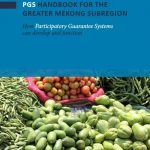
1 download
Title of document: PGS Handbook for the Greater Mekong Sub Region: How Participatory Guarantee Systems can develop and function Authors: IFOAM Journal’s name if any: Ministry/Government Agency/Organisation: ADB, Greater Mekong Sub Region, IFOAM, FAO Year of publication: 2017 Geographic focus: Asia & Mekong region Main issues / topics addressed (for example: Background; Key elements and compliance; Structure and organization; Final Remarks and Recommendations …) School of agroecology (if any): Web address to original document (if any): https://www.ifoam.bio/sites/default/files/pgs_handbook_gms.pdf Summary: This publication builds on the IFOAM PGS Guidelines, a publication that was first commissioned and funded by IFOAM – Organics International through its “IFOAM - Organics International - Growing Organic” program (I-GO), funded by Hivos, Netherlands and the “Fund for Sustainable Biodiversity Management” of the Dutch Government. The publication was revised and adapted for the Greater Mekong Subregion from 2014 to 2016 with support from the Asian Development Bank (ADB) in the framework of the TA 8163 PGS project and the Food and Agriculture Organization of the United Nations (FAO) in the framework of the TCP/RAS/3510. Read More
5 downloads
Title of document: How to raise political awareness of the need for support to organic agriculture: Tips for organic advocates Authors: IFOAM Journal’s name if any: Ministry/Government Agency/Organisation: IFOAM Year of publication: 2017 Geographic focus: General Main issues / topics addressed (for example: Tips for organic advocates …) School of agroecology (if any): Web address to original document (if any): http://www.ifoam.bio/en/global-policy-toolkit-public-support-organic-agriculture Summary: This document has been produced and published by IFOAM-Organics International in 2017 as part of the Global Policy Toolkit on Public Support to Organic Agriculture Read More
7 downloads
Title of document: Organic Policy Template Authors: IFOAM Journal’s name if any: Ministry/Government Agency/Organisation: IFOAM Year of publication: 2017 Geographic focus: General Main issues / topics addressed (for example: Organic Policy Template…) School of agroecology (if any): Web address to original document (if any): Summary: Organic Policy Template by IFOAM Read More
5 downloads
Title of document: Why and how should policy makers support organic agriculture Authors: IFOAM Journal’s name if any: Ministry/Government Agency/Organisation: IFOAM Year of publication: Geographic focus: General Main issues / topics addressed (for example: The academic perspective: economic rational; The public goods generated by OA; Why “subsidize” organic agriculture?; The organic policy tree…) School of agroecology (if any): Web address to original document (if any): Summary: General presentation for Why and how should policy makers support organic agriculture by IFOAM Read More
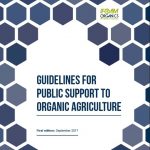
14 downloads
Title of document: Guidelines for Public Support to Organic Agriculture _ Version English & African Authors: IFOAM Journal’s name if any: Ministry/Government Agency/Organisation: IFOAM Year of publication: 2017 Geographic focus: Africa Main issues / topics addressed (for example: Context, scope and use of these guidelines; Why it makes political sense to support organic agriculture; History and overview of public support to organic agriculture globally; Determining the right mix of support measures: national/regional action plans and guidelines…) School of agroecology (if any): Web address to original document (if any): https://www.ifoam.bio/en/global-policy-toolkit-public-support-organic-agriculture Summary: the "Guidelines for public support to organic agriculture": these guidelines make the cornerstone of the toolkit and present the fullest possible compilation of facts, arguments and tips of the full panel of policy measures that can be conceived to support organic agriculture. Most of the sections of this main report are also broken down into separate documents, for easier download and use. The report is targeted to policy makers and policy advocates. IFOAM-Organics International also developed a special Sub-Saharan African version of the main report, which focuses on the information most relevant in the context of Sub-Sarahan African countries Read More
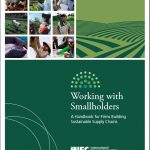
7 downloads
Title of document: Working with Smallholders: A Handbook for Firms Building Sustainable Supply Chains Authors: IFC Journal’s name if any: Ministry/Government Agency/Organisation: IFC Year of publication: 2013 Geographic focus: Global level Main issues / topics addressed (for example: Introduction; The Business Case for Working with Smallholder Farmers; An Evidence-Based Approach to Program Design; Aggregation Through Producer Organizations…) School of agroecology (if any): Web address to original document (if any): Summary: This handbook is a guide for firms who wish to expand their supply chains by working with smallholder farmers. The purpose is to enable more productive interactions between private firms and smallholders. This contribution is a part of our larger investment and advisory services in agribusiness that aim to shift our global food system to one where sustainable production is the norm and food and nutritional security is secured for this and for future generations. Read More
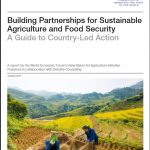
8 downloads
Title of document: Building Partnerships for Sustainable Agriculture and Food Security: A Guide to Country-Led Action Authors: NVA, Deloitte Consulting Journal’s name if any: Ministry/Government Agency/Organisation: NVA, Deloitte Consulting Year of publication: 2016 Geographic focus: Global level Main issues / topics addressed (for example: Introduction: A New Model for Action; The New Vision for Agriculture Experience: From Global Vision to Country-Led Action; The New Vision for Agriculture Country Partnership Model …) School of agroecology (if any): Web address to original document (if any): Summary: Over the past five years, the World Economic Forum’s New Vision for Agriculture (NVA) initiative has supported leaders in 19 countries across Asia, Africa and Latin America to develop action-oriented partnerships on the ground. These partnerships have mobilized over $10.5 billion in investment commitments, of which $1.9 billion has been implemented to date, benefiting 9.6 million farmers. The aim of this guide is to provide a dynamic resource that will empower and inspire the leaders who can build on and further develop these learnings to drive a transformation of the world’s agriculture and food systems. A report by the World Economic Forum’s New Vision for Agriculture initiative Prepared in collaboration with Deloitte Consulting, January 2016 Read More
7 downloads
Title of document: Annex of ADG's activity in Cambodia Authors: ADG Journal’s name if any: Ministry/Government Agency/Organisation: ADG Year of publication: Geographic focus: Cambodia Main issues / topics addressed (for example:…) School of agroecology (if any): Web address to original document (if any): Summary: 3 Annex of ADG's activity in Cambodia Read More
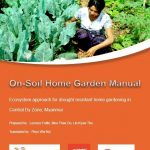
93 downloads
Title of document: On-Soil Home Garden Manual: Ecosystem approach for drought resistant home gardening in Central Dy Zone, Myanmar _ Version English and Myanmar Authors: Lorenzo Fellin, Moe Thae Oo, Lin Kyaw Thu Journal’s name if any: Ministry/Government Agency/Organisation: TDH, GRET/ALiSEA, AFD Year of publication: 2018 Geographic focus: Myanmar Main issues / topics addressed (for example: Home garden design and construction; Conservative Practices; Crop Plan; Garden Management…) School of agroecology (if any): Web address to original document (if any): Summary: Climate and soil type in the Dry Zone makes vegetable cultivation and availability extremely difficult, during the dry season and not only. From December to April most farmers of the area can only wait until the rainy season to begin cultivation of main crops, such as Pigeon Pea, Mung Bean, Sesame and Groundnut. However, the nutritional input given by fresh and green vegetable is often insufficient. The situation is worsened by climate change and the tendency of farmers to rely on extensive agriculture based on chemical input. While this approach might give initial benefits on productivity, it is highly unsustainable and deepens the environmental problems of the area (soil erosion, loss and desertification). However, thanks to the right techniques and conservative practices is possible to: cultivate all year round without relying on excessive chemical inputs; improve nutritional intake and decrease expenses on food. This has been the aim of ALiSEA project Ecosystem approach for drought resistant home gardening in Central Dry Zone implemented by TDH Italy: improving the livelihood of the beneficiaries through sustainable home garden vegetable production. The purpose of the following handbook is to provide the necessary information for the construction and management of a home garden using agroecological practices Read More
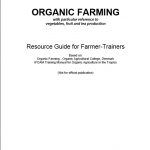
60 downloads
Title of document: Resource Guide for Farmer-Trainers _ Based on: Organic Farming - Organic Agricultural College, Denmark IFOAM Training Manual for Organic Agriculture in the Tropics Authors: Koen den Braber Journal’s name if any: Ministry/Government Agency/Organisation: ADDA Organic project Year of publication: 2007 Geographic focus: Vietnam Main issues / topics addressed (for example: Introduction; The Living Soil; Soil and Water Management; Farm Nutrient Balance; Plant Nutrition - Keeping the Balance…) School of agroecology (if any): Web address to original document (if any): Summary: Organic farming tries to work with nature as much as possible. This applies both to the crops and animals, which provide the basis for our survival, as well as the surrounding natural environment Organic agriculture constitutes only a small portion in the world's agriculture, rarely constituting a few percent of a country's farming sector. Governmental support for research, extension or marketing in organic farming is still very low in most countries. Nevertheless, organic farming at present has promising growth rates all over the world Read More

 Asia & Mekong Region
Asia & Mekong Region  Cambodia
Cambodia  Laos
Laos  Myanmar
Myanmar  Other
Other  Vietnam
Vietnam